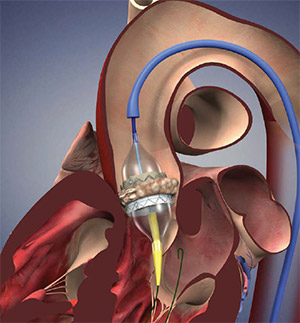Transcatheter Aortic Valve Replacement (TAVR)
Transcatheter aortic valve replacement (TAVR) is a surgical procedure for patients with severe and symptomatic narrowing of the aortic valve opening, known as aortic stenosis.
How does it work?
 Transcatheter aortic valve replacement involves replacing a damaged aortic valve with one made from cow or pig heart tissue.
Transcatheter aortic valve replacement involves replacing a damaged aortic valve with one made from cow or pig heart tissue.
To perform TAVR, the doctor may access the patient’s heart through a blood vessel in the leg or a tiny incision in the chest. A catheter is inserted through the access point and is guided by imaging technology to the heart and into the aortic valve.
Once the new valve is positioned, a balloon is inflated to expand the replacement valve into the appropriate position. When the physician is confident the valve is in place, the catheter is removed.
Am I a good candidate for treatment?
TAVR may be an option for patients who:
- Have aortic stenosis that causes signs and symptoms
- Have a risk of complications from surgical aortic valve replacement
- Have an existing biological tissue valve that isn’t working well anymore
What can I expect after treatment?
Patients may spend the night in the ICU for monitoring after the procedure, and an additional two to five days recovering in the hospital.
Patients will need regular follow up appointments with a physician after the procedure. TAVR may relieve the signs and symptoms of aortic valve stenosis and improve a patient’s overall health and quality of life. Patients should report any new or worsening signs or symptoms to their physician.
A physician may also recommend healthy lifestyle changes such as eating a heart-healthy diet, exercising regularly, maintaining a healthy weight, and avoiding smoking.
U.S. News & World Report, the global authority in hospital rankings and consumer advice, has named Deborah Heart and Lung Center as a 2024-2025 High Performing hospital for Transcatheter Aortic Valve Replacement (TAVR). This is the highest award a hospital can earn for U.S. News’ Best Hospitals Procedures & Conditions ratings, and is given in recognition of care that was significantly better than the national average, as measured by factors such as patient outcomes.
The U.S. News Procedures & Conditions methodology is based entirely on objective measures of quality such as survival rates, patient experience, and how successfully each hospital helps patients get back home.
Transfemoral Procedure
TAVR is for people who have been diagnosed with severe aortic stenosis and are considered either high-risk or too sick for open heart surgery. This less invasive procedure is different than open heart surgery.
Watch Video